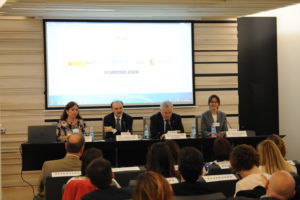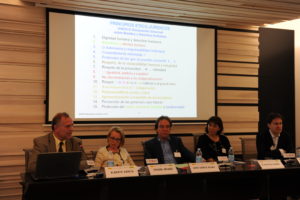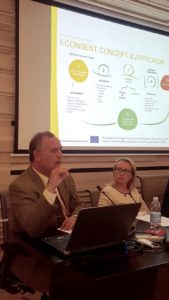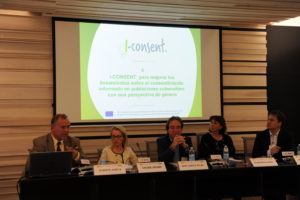By Fausto Martinez & Andrea Iannone –
Bioethics is the discipline that studies human behavior in healthcare and life sciences. It also examines values, rational, and moral principles at the basis of decisions in medicine and biology. Bioethicists recognize that mankind has always pursued greater knowledge, and that the goal of scientific research is to obtain concrete benefits for patients. Therefore, bioethicists are often concerned about the researcher or doctor on one hand, and the patient as the subject of experimentation on the other. In between them lie a vast array of recent technological developments (for example, biotechnology) that stimulate a series of questions. Is science “unstoppable” or does it have limits? Is biomedical technology truly morally neutral? Is emphasizing the human utility of scientific investigation and experimentation ethically relevant?
 Researchers addressed these and other questions at the third symposium by A.S.I.E.R.I (Asociación de Investigadores Españoles en la República Italiana, the Association of Spanish Researchers in Italy) on May 18, 2018, at the the Real Academia de España en Roma, Italy. The topic of the conference was “Responsible Innovation and Research”. Further discussion centered on the I-Consent project, funded by the European Union Horizon 2020 Programme. Briefly put, the project aims to improve guidelines on informed consent in vulnerable populations under a gender perspective.
Researchers addressed these and other questions at the third symposium by A.S.I.E.R.I (Asociación de Investigadores Españoles en la República Italiana, the Association of Spanish Researchers in Italy) on May 18, 2018, at the the Real Academia de España en Roma, Italy. The topic of the conference was “Responsible Innovation and Research”. Further discussion centered on the I-Consent project, funded by the European Union Horizon 2020 Programme. Briefly put, the project aims to improve guidelines on informed consent in vulnerable populations under a gender perspective.

Innovation and research can be defined as “responsible” if they respect human rights. Based on the ethical and juridical principles of the Universal Declaration on Bioethics and Human Rights, human rights are human beings’ inherent moral and legal entitlements to dignity, liberty, and equality at any historical moment, in any context. Therefore, the human dignity of both the patient and the researcher must be respected in scientific research and medical practice.
Since they can experience pain, distress and lasting damage, animals are also entitled to humane treatment in medical and scientific research. Whenever possible, appropriately licensed scientists should experiment with specimens with lower neurophysiological sensitivity, thus reducing the number of live vertebrates involved. When animals with higher pain sensitivity are necessary for experimental purposes, researches are advised to adopt techniques to avoid suffering, stress, or injury.

During the symposium, Prof. Alberto García, Director of UNESCO Chair in Bioethics and Human Rights at Università Europea di Roma and the Pontifical Athenaeum Regina Apostolorum, underscored the importance of respecting the human patient’s privacy. This process includes compliance on the part of the experimenting institution with data collection and sharing regulation being paramount. Patients have a right to know what data is collected, with whom it is shared, and how they can rectify or delete it – if they so choose – in the future.
According to García, non-discriminatory and non-stigmatizing medical research practices ensure the equal treatment of patients. He also stated that patients’ rights need to be observed not only during research, but also after its completion. Once a drug has been released onto the market, there must be a phase of pharmaceutical vigilance to monitor identify and evaluate previously unreported adverse reactions to the drug.
 In his last point, Garcia discussed the I-Consent project. In particular, our UNESCO Chair will explore and analyze baseline knowledge of IC for the development and validation of ethical issues concerning informed consent in translational/clinical research and vaccination. Clear informed consent procedures ensure that patients’ dignity is upheld. Informed Consent is a document of utmost important for a patient since it allows him to voluntarily decide to participate in research. However, the research’s objectives are often not shared with the concerned stakeholders. That is why informed consent must become a process during which patients have the essential information clearly presented to them. Innovative tools, such as videos, comic strips, or apps might favor communication among all stakeholders. If not, those unable to consent – often the most vulnerable among us – risk seeing their human rights violated.
In his last point, Garcia discussed the I-Consent project. In particular, our UNESCO Chair will explore and analyze baseline knowledge of IC for the development and validation of ethical issues concerning informed consent in translational/clinical research and vaccination. Clear informed consent procedures ensure that patients’ dignity is upheld. Informed Consent is a document of utmost important for a patient since it allows him to voluntarily decide to participate in research. However, the research’s objectives are often not shared with the concerned stakeholders. That is why informed consent must become a process during which patients have the essential information clearly presented to them. Innovative tools, such as videos, comic strips, or apps might favor communication among all stakeholders. If not, those unable to consent – often the most vulnerable among us – risk seeing their human rights violated.

